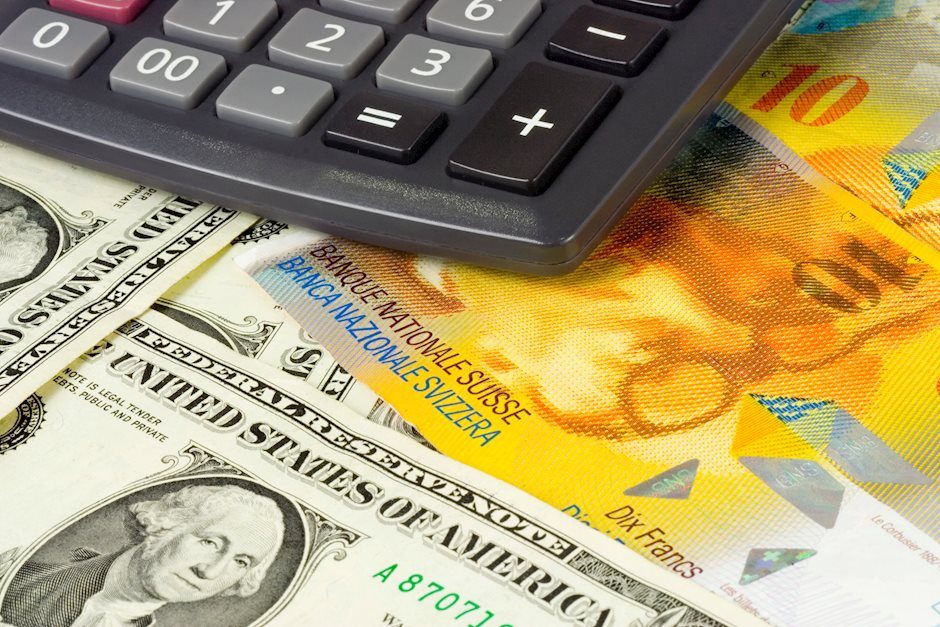USD/CHF gains ground near 0.8850, potential upside seems limited
- USD/CHF holds positive ground near 0.8840 in Thursday’s early European session.
- Fed’s Waller said that central bank is nearing rate cuts if there are no major surprises in inflation, employment data.
- The rate cuts expectation by the SNB might drag the US Dollar lower.

The USD/CHF pair trades on a positive note around 0.8840, snapping the two-day losing streak on Thursday during the early European trading hours. The modest rebound of the US Dollar (USD) provides some support to the pair. Looking ahead, traders will take more cues from the weekly Initial Jobless Claims and Philly Fed Manufacturing Index.
The recent dovish comments from Federal Reserve (Fed) officials boost bets of a US interest rate cut in September and might cap the upside for Greenback in the near term. Markets are fully pricing in a rate cut of at least 25 basis points (bps) by the Fed in September, according to CME's FedWatch Tool. Fed Governor Christopher Waller said that the US central bank is nearing an interest rate cut as long as there are no major surprises in inflation and employment data. Meanwhile, Richmond Fed President Thomas Barkin stated that easing in inflation has begun to broaden and he would like to see it continue.
Earlier this week, Fed Chair Jerome Powell said recent inflation readings "add somewhat to confidence" that the pace of price increases is on track to meet the Fed's target in a sustainable manner, suggesting a shift to rate cuts is on the horizon.
On the Swiss front, the safe-haven flows amid the political uncertainty and geopolitical tensions might lift the Swiss Franc (CHF) and create a headwind for USD/CHF. However, the expectation that the Swiss National Bank (SNB) could cut further interest rates might weigh on the CHF. Kyle Chapman, FX markets analyst at Ballinger Group said, "I expect the SNB to follow up with a third cut next quarter, and there is potential for a fourth in December if there is still high conviction in the restrictive level of monetary policy. The dovish outlook puts the Franc in a vulnerable position over the coming quarters and could hinder any further recovery, particularly if the ECB takes its time in bringing rates down.”
Swiss Franc FAQs
The Swiss Franc (CHF) is Switzerland’s official currency. It is among the top ten most traded currencies globally, reaching volumes that well exceed the size of the Swiss economy. Its value is determined by the broad market sentiment, the country’s economic health or action taken by the Swiss National Bank (SNB), among other factors. Between 2011 and 2015, the Swiss Franc was pegged to the Euro (EUR). The peg was abruptly removed, resulting in a more than 20% increase in the Franc’s value, causing a turmoil in markets. Even though the peg isn’t in force anymore, CHF fortunes tend to be highly correlated with the Euro ones due to the high dependency of the Swiss economy on the neighboring Eurozone.
The Swiss Franc (CHF) is considered a safe-haven asset, or a currency that investors tend to buy in times of market stress. This is due to the perceived status of Switzerland in the world: a stable economy, a strong export sector, big central bank reserves or a longstanding political stance towards neutrality in global conflicts make the country’s currency a good choice for investors fleeing from risks. Turbulent times are likely to strengthen CHF value against other currencies that are seen as more risky to invest in.
The Swiss National Bank (SNB) meets four times a year – once every quarter, less than other major central banks – to decide on monetary policy. The bank aims for an annual inflation rate of less than 2%. When inflation is above target or forecasted to be above target in the foreseeable future, the bank will attempt to tame price growth by raising its policy rate. Higher interest rates are generally positive for the Swiss Franc (CHF) as they lead to higher yields, making the country a more attractive place for investors. On the contrary, lower interest rates tend to weaken CHF.
Macroeconomic data releases in Switzerland are key to assessing the state of the economy and can impact the Swiss Franc’s (CHF) valuation. The Swiss economy is broadly stable, but any sudden change in economic growth, inflation, current account or the central bank’s currency reserves have the potential to trigger moves in CHF. Generally, high economic growth, low unemployment and high confidence are good for CHF. Conversely, if economic data points to weakening momentum, CHF is likely to depreciate.
As a small and open economy, Switzerland is heavily dependent on the health of the neighboring Eurozone economies. The broader European Union is Switzerland’s main economic partner and a key political ally, so macroeconomic and monetary policy stability in the Eurozone is essential for Switzerland and, thus, for the Swiss Franc (CHF). With such dependency, some models suggest that the correlation between the fortunes of the Euro (EUR) and the CHF is more than 90%, or close to perfect.
Author

Lallalit Srijandorn
FXStreet
Lallalit Srijandorn is a Parisian at heart. She has lived in France since 2019 and now becomes a digital entrepreneur based in Paris and Bangkok.

















